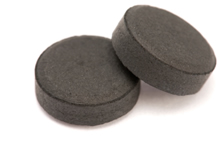
More evidence that low-calorie sweeteners are bad for your health
Studies show that artificial sweeteners can raise the risk of hypertension, metabolic syndrome, type 2 diabetes and heart disease, including stroke.

Charcoal has been used for medicinal and other purposes for centuries.
Traditional cultures have used charcoal to heal wounds, purify the blood, treat asthma, act as a deodorant, reduce inflammation and ease stomach complaints.
Common charcoal is made from peat, coal, wood, coconut shell or petroleum. Activated charcoal is similar to common charcoal, but is made especially for use as a medicine. To make activated charcoal, manufacturers treat common charcoal with oxygen to open up millions of tiny internal spaces or ‘pores’. These pores increase the surface area of the charcoal and help it ‘trap’ or adsorb (bond them to its surface), odours and chemicals.
If you have a water filter jug in your kitchen it is likely to contain activated carbon as a filtering agent to ‘grab’ certain contaminants from your water.
In medicine activated charcoal is used mainly to treat poisonings, reduce flatulence, lower cholesterol levels, and even to prevent hangover.
Emergency poisonings
Several studies into activated charcoal have looked it as an emergency intervention to remove toxic substances from the body is well documented over many decades. By trapping chemicals in its tiny pores it prevents them being absorbed via the stomach into the body.
It absorbs some but not all toxic substances and is most effective if used within one hour of ingesting toxic substances. It has proven to be effective in both adult and child overdoses of drugs such as acetaminophen, digoxin, digitoxin, tricyclic antidepressants, and barbiturates as well as pesticides and some heavy metals. But it does not prevent the absorption of everything; alcohols (ethanol, methanol, ethylene glycol), alkalis (lye) and strong acids, iron, boric acid, lithium, DDT, malathion, petroleum products (e.g., cleaning fluid, coal oil, fuel oil, gasoline, kerosene, paint thinner), that have been swallowed are poorly absorbed by activated charcoal.
There is also reasonable evidence that activated charcoal can relive flatulence. In order to be effective it needs to be taken 1g at least 30 minutes before consumption of a meal and 1g after the meal.
Conflicting evidence
There are, however, conflicting views on whether activated charcoal is useful for lowering cholesterol, were preventing hangover.
Nutritionists believe that charcoal supports detoxification in the body. Scientific evidence for this is lacking, but it is possible that the reduction of toxins accomplished by the short-term use the activated charcoal takes some of the pressure off of the body’s detoxification system (for instance the liver and kidneys) giving it time to rest and repair.
Some activated charcoal products contain sorbitol to make them more palatable. Sorbitol is a sweetener. It also works as a laxative, aiding the elimination of the poison from the body. Products that contain sorbitol should be given only under the direct supervision of a doctor because severe diarrhoea and vomiting can result. The official view is that charcoal should not be used routinely with substances like sorbitol or ipecac as these reduce its effectiveness.
Side-effects & cautions
Activated charcoal is not without side-effects which include constipation and black stools. If you are pregnant or breastfeeding, it might not be safe and it is best to consult a practitioner before using it. It is also recommended that you avoid activated charcoal if you have any kind of intestinal obstruction or a condition that slows the passage of food through your intestine.
Most authorities don’t recommend routine or automatic treatment with activated charcoal, even in emergency situations. Each case needs to be assessed individually.
For those intending to use it at home, you should know that activated charcoal is indiscriminate what it absorbs. Therefore it should not be taken with food as it also adsorbs enzymes, vitamins, amino acids, minerals, and other nutrients from the GI tract. Nor should it be taken with medicines as it would adsorb them too. It should also not be taken for long periods of time. It is, however, could be helpful for what ails you in the short term. If in doubt, always consult a practitioner for advice.

Please subscribe me to your newsletter mailing list. I have read the
privacy statement